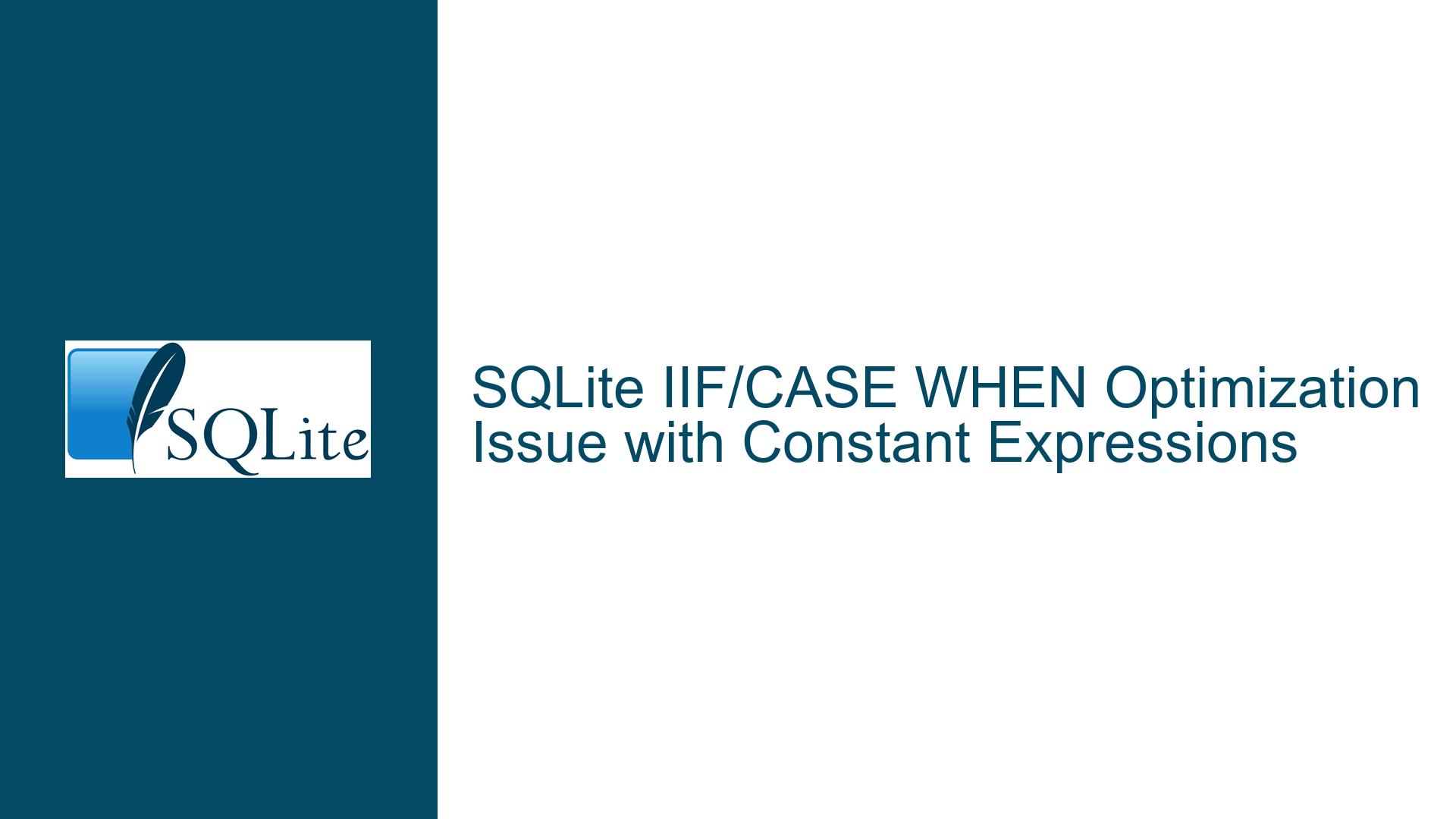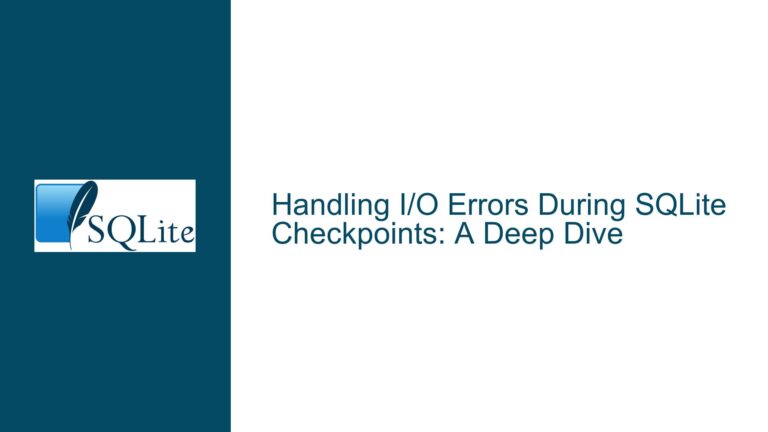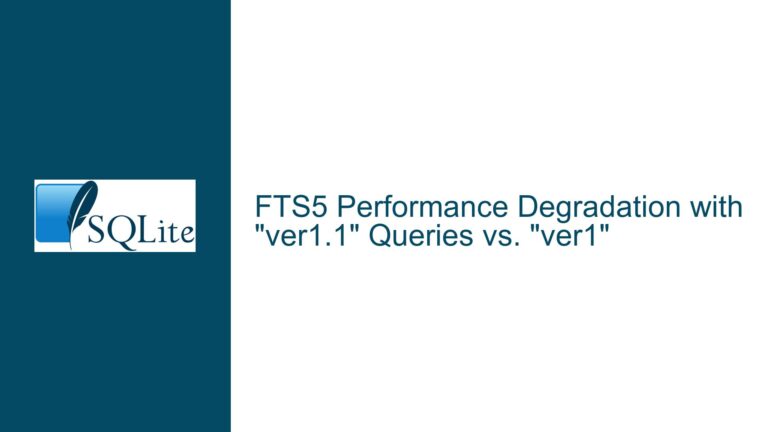SQLite IIF/CASE WHEN Optimization Issue with Constant Expressions
Issue Overview: IIF/CASE WHEN Constant Expressions Not Optimized in SQLite Queries
In SQLite, the IIF function and its equivalent CASE WHEN construct are powerful tools for conditional logic within queries. However, there is a notable performance issue when these constructs are used with constant expressions. Specifically, SQLite does not optimize queries where the IIF or CASE WHEN function contains a constant expression in its second or third argument. This results in suboptimal query performance, particularly when compared to queries that use direct constant expressions without conditional logic.
For example, consider a table t with a column v indexed for efficient searching. A query like SELECT * FROM t WHERE v LIKE 'A%' is optimized and executes quickly because SQLite recognizes the constant expression 'A%' and leverages the index on v. However, a query like SELECT * FROM t WHERE v LIKE IIF(1=1, 'A%', '') does not benefit from the same optimization. Despite the condition 1=1 being a constant true value, SQLite does not treat the result of the IIF function ('A%') as a constant expression. Consequently, the query planner fails to utilize the index on v, leading to slower execution.
This behavior contrasts with other database systems like MySQL and Microsoft SQL Server, which optimize such queries by evaluating constant expressions within IIF or CASE WHEN constructs at query planning time. The lack of this optimization in SQLite can lead to significant performance degradation, especially in queries involving large datasets or complex conditional logic.
Possible Causes: Why SQLite Fails to Optimize IIF/CASE WHEN with Constant Expressions
The root cause of this issue lies in SQLite’s query optimization strategy and its handling of conditional expressions. SQLite’s query planner is designed to evaluate and optimize queries based on the structure of the SQL statement and the available indexes. However, it does not currently perform constant folding or expression simplification for the arguments of the IIF or CASE WHEN functions during query planning. Constant folding is a compiler optimization technique where expressions consisting of constants are evaluated at compile time rather than at runtime. In the context of SQLite, this means that expressions like IIF(1=1, 'A%', '') are not simplified to 'A%' during query planning.
There are several reasons why SQLite might not implement this optimization:
Trade-offs in Optimization Costs: As noted by Richard Hipp, the creator of SQLite, every optimization involves trade-offs. Implementing constant folding for
IIFandCASE WHENwould require additional CPU cycles during query preparation to check whether the optimization is applicable. While this cost is small for individual queries, it becomes significant when multiplied across the billions of queries executed daily in SQLite. For the vast majority of queries where this optimization does not apply, the additional overhead would result in a net performance loss.Complexity of Conditional Logic: Conditional expressions can be complex, involving nested
IIForCASE WHENconstructs, subqueries, or user-defined functions. Implementing constant folding for such expressions would require significant changes to SQLite’s query planner and could introduce new edge cases or bugs. The complexity of handling all possible scenarios might outweigh the benefits of the optimization.Focus on Simplicity and Predictability: SQLite is designed to be a lightweight, embedded database engine with a focus on simplicity and predictability. The current behavior of
IIFandCASE WHENis consistent and predictable, even if it is not always optimal. Introducing optimizations for specific cases could make the behavior of SQLite less predictable, especially for users who rely on its consistent performance characteristics.Limited Use Cases: The scenario where a constant expression is used within an
IIForCASE WHENconstruct is relatively rare. Most queries either use direct constant expressions or more complex conditional logic that cannot be optimized. Given the limited use cases, the benefits of implementing this optimization might not justify the associated costs.
Troubleshooting Steps, Solutions & Fixes: Addressing the IIF/CASE WHEN Optimization Issue
While SQLite does not currently optimize IIF or CASE WHEN with constant expressions, there are several strategies to address this issue and improve query performance:
Rewrite Queries to Use Direct Constant Expressions: The simplest and most effective solution is to rewrite queries to avoid using
IIForCASE WHENwith constant expressions. For example, the querySELECT * FROM t WHERE v LIKE IIF(1=1, 'A%', '')can be rewritten asSELECT * FROM t WHERE v LIKE 'A%'. This approach ensures that SQLite’s query planner recognizes the constant expression and leverages the index onv.Use Static Conditional Logic in Application Code: If the conditional logic is static and known at the time of query construction, it can be moved to the application code. For example, instead of embedding the condition
1=1in the SQL query, the application can determine the appropriate constant expression and construct the query dynamically. This approach shifts the responsibility of evaluating constant expressions to the application, allowing SQLite to optimize the query based on the final constant value.Leverage SQLite’s Expression Indexes: In some cases, it may be possible to create an expression index that includes the conditional logic. For example, an index on
vwith a condition likev LIKE 'A%'can be created to optimize queries that use this pattern. However, this approach is limited to specific use cases and may not be practical for dynamic or complex conditional logic.Evaluate the Use of Other Database Systems: If the lack of optimization for
IIFandCASE WHENwith constant expressions is a critical issue for your application, it may be worth evaluating other database systems that support this optimization. MySQL and Microsoft SQL Server, for example, optimize such queries by evaluating constant expressions within conditional constructs. However, this approach involves significant trade-offs, including increased complexity, resource requirements, and potential compatibility issues.Contribute to SQLite’s Development: As an open-source project, SQLite welcomes contributions from the community. If this optimization is important to your use case, consider contributing a patch to SQLite that implements constant folding for
IIFandCASE WHENwith constant expressions. This approach requires a deep understanding of SQLite’s query planner and optimization strategies, as well as thorough testing to ensure that the changes do not introduce new issues or regressions.Monitor and Profile Query Performance: Regardless of the approach taken, it is essential to monitor and profile query performance to identify and address any bottlenecks. SQLite provides several tools for profiling and analyzing query performance, including the
EXPLAIN QUERY PLANstatement and thesqlite3_profilefunction. These tools can help identify queries that are not optimized and guide the selection of appropriate solutions.
In conclusion, while SQLite does not currently optimize IIF or CASE WHEN with constant expressions, there are several strategies to address this issue and improve query performance. By rewriting queries, leveraging application logic, or exploring alternative solutions, developers can mitigate the impact of this limitation and ensure efficient query execution. Additionally, contributing to SQLite’s development or evaluating other database systems may provide long-term solutions for specific use cases.






